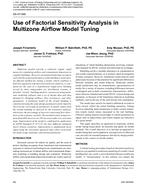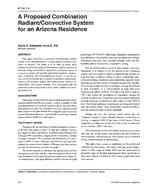Frost forms on most refrigeration coils that cool air in spaces at temperatures below 32°F (0°C). If not removed from a finned coil, this frost will ultimately block the passage of air causing a loss in refrigeration capacity. There are several methods of defrosting coils (electric heaters, warm air, water, etc.)* and one of the popular methods is hot-gas defrost.
Because the incentive to conserve energy continues to grow, more and more processes come under scrutiny to determine their energy implications. The two major ways in which the hot-gas defrost process affects the energy required by the refrigeration plant are (1) the condensing pressure required by the defrost, and (2) the efficiency of the defrost process in using the energy in the high-pressure gas for melting the frost.
Product Details
- Published:
- 1982
- Number of Pages:
- 45
- File Size:
- 1 file , 1.2 MB
- Product Code(s):
- D-RP-193


